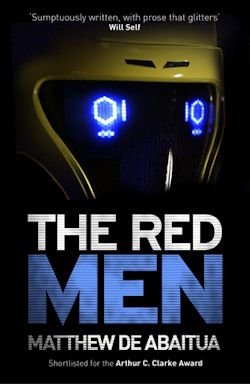I’ll come right out and say it: for a moment there, I thought we’d lost Angry Robot.
Obviously not. Recently they’ve re-signed Wesley Chu, bought two books by Alyc Helms, saved Danielle L. Jensen’s Malediction trilogy—Strange Chemistry’s biggest success story—from the ashes of that much-missed imprint, and now, news of another new arrival: Will Self’s erstwhile amanuensis, author Matthew de Abaitua, has enrolled in the reenergised Angry Robot Army.
Abaitua is of course known for rather more than taking dictation: his debut, The Red Men, was nominated for an Arthur C. Clarke Award, and in 2013, the first chapter was turned into a sensational short film. You do remember Dr. Easy, don’t you?
That said, it’s been seven years since the release of The Red Men, and I couldn’t help but wonder what the author had been up to in the interim, so I found @MDeAbaitua on Twitter and asked Angry Robot’s new recruit a couple of questions.
After finishing The Red Men, I embarked upon a brief non-SF novel that didn’t really work and lives in a drawer. Then a lot of life happened to me. I had a bunch of children, stopped work and fell into poverty—not quite Philip K. Dick-eating-dog-food poverty but pretty bracing.
To find his way back to books, Abaitua went to work on a history of camping. In the course of researching said, he became interested in “interwar nature groups such as the Kindred of the Kibbo Kift, their futurism, their idealism, and their experience of World War I.”
This fascination—with war experienced not from within or outwith, but from between these extremes; from, for instance, the perspective of a stretcher bearer or an ambulance driver—this fascination was to form the foundation of If Then, the first of the two books Angry Robot just bought.
Basically I wanted to re-experience the war as a science fiction event, as a monster of technology with an inhuman agency. And I wanted to write post-austerity SF about a disenfranchised and redundant middle class being maintained by an algorithm. Because that was my experience at the time. And wandering the Downs I had a keen sense—almost a vision, among the sea fret—of a newly-dug trench appearing in the Downland. Science fiction combines the cognitive reasoning impulse with the irrational, dreaming, will-to-strangeness. So I went along with this vision of a long-lost war being recreated by a non-human agency. There comes a point where you just have to get on your hands and knees and crawl deeper into the rabbit hole.

The resulting text is a tale of two parts, apparently, “bringing the First World War to an English town of the near-future, where an economic collapse has left the citizens under the control of an algorithm known as the Process.” If Then will be released in September 2015…
…only to be succeeded sometime in 2016 by another novel set in the same continuity.
“Copywriters [have a history of] moonlighting as SF writers,” Abaitua explained, so it’s no surprise that “there a few advertising-agencies-in-space SF stories.” But “because capitalism runs on cycles of creation and destruction, calling yourself a ‘creative’ limits you to only half the business. You could be a destructive as well.” Thus The Destructives, which early readers are referring to as “Man Men in space.”
Angry Robot’s Marc Gascoigne could hardly be happier to have Abaitua on board. “He reminds me of the very best boundary-pushers of English SF,” mooted the managing director, “including Christopher Priest and M. John Harrison, and I’m delighted we will be bringing you his exceptional novels soon.”
That’s some illustrious company to be keeping, and I’m keen to see if Angry Robot’s new recruit can stand strong amongst the aforementioned masters.
Abaitua’s own aims are rather more modest, mind:
I want [If Then] to be read. I want individual readers to have an intense, enjoyable, undistracted experience with the novel. This may sound like a humble aim but this afternoon I’ve decided that it’s the job of science fiction writers to get more people to read more science fiction, simple as that, and hope that engagement with SF ideas and the form and all the amazing work in the genre and on the edge of it, and in argument with it, constitutes some kind of moral and aesthetic good.
Me? I think it might.
Niall Alexander is an extra-curricular English teacher who reads and writes about all things weird and wonderful for The Speculative Scotsman, Strange Horizons, and Tor.com. He’s been known to tweet, twoo.










